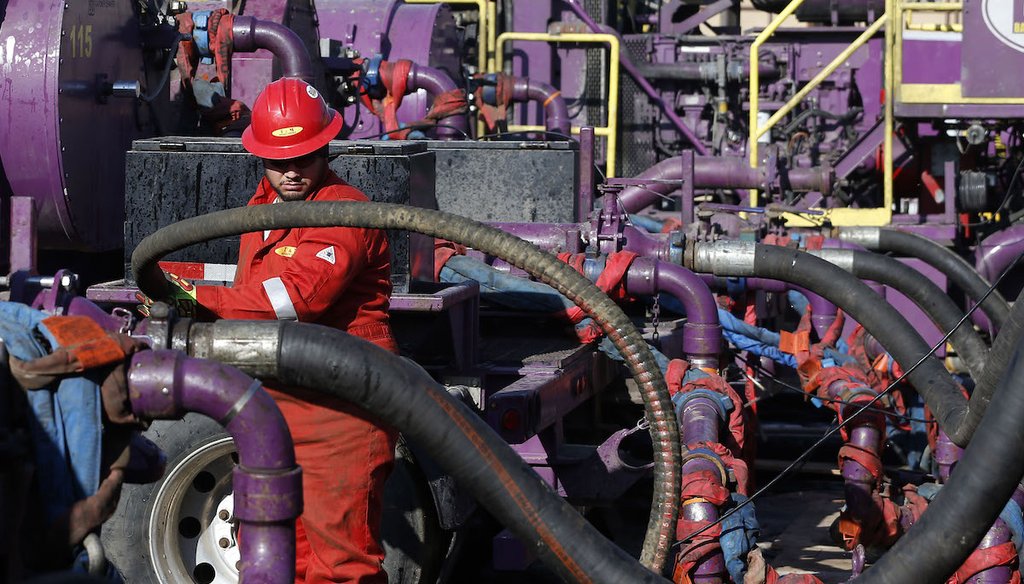Get PolitiFact in your inbox.
Court ruling, administration backtracking undercut fracking ban

A worker adjusts hoses during a hydraulic fracturing operation at an Encana Corp. oil well, near Mead, Colo. (AP Photo/Brennan Linsley)
Fracking revolutionized the oil and gas industry, creating a torrent of new supply that drove down the price of natural gas. The process, which injects water, sand and chemicals far beneath the surface to extract oil and gas, has threatened water supplies and been linked to earthquakes. Many Democratic voters, especially younger ones, oppose fracking, and President Joe Biden adopted a targeted approach that focused solely on fracking on federal lands.
Soon after taking office, he announced that he would put all new oil and gas leasing on hold "pending completion of a comprehensive review" by the Interior Department. More than a dozen states sued to block the move. In June, a federal judge agreed, saying the states had "made a showing that there is a substantial likelihood that President Biden exceeded his powers."
The court placed a temporary injunction on Biden's leasing pause, pending a full court ruling. The White House press office said that effectively tied the administration's hands, and leasing had to continue.
In November, the Interior Department completed its review and recommended a rise in leasing rates for both onshore and offshore drilling. The goal would be to encourage leasing on more productive land and make the program a better deal for the government and taxpayers.
Right before the department issued its report, it leased 1.7 million acres in the Gulf of Mexico to oil and gas producers.
While some environmental groups, such as the Natural Resources Defense Council, gave the administration credit for improvements to the leasing program, they called the absence of a ban on new leasing notable.
"Opening new areas to oil and gas development amounts to ignoring what science tells us is necessary to avoid the catastrophic effects of climate change," an NRDC policy team said in a Nov. 30, 2021, statement. "The agency should end new oil and gas leasing in federal waters and limit future onshore leasing to the greatest extent possible."
Some environmentalists say Biden might be able to do more to curb greenhouse gas emissions through stricter controls on methane releases, rather than a full leasing ban. Methane is a much more potent greenhouse gas than carbon dioxide.
But on the campaign, Biden said his ban would apply to new leases on federal land. That has not happened. There is an opportunity for the administration to revisit the issue, at least for offshore permits. A new leasing program is due for the 2023-2027 period, when strict limits could be applied.
For now, we rate this promise Stalled.
Our Sources
KDKA, Joe Biden Talks Pittsburgh, Fracking And President Donald Trump's Handling Of Coronavirus, April 20, 2020
U.S. District Court - Western District of Louisiana, Temporary injunction, June 15, 2021
U.S. Interior Department, Interior Department Report Finds Significant Shortcomings in Oil and Gas Leasing Programs, Nov. 26, 2021
U.S. Interior Department, Report on the Federal Oil And Gas Leasing Program, Nov. 26, 2021
U.S. Bureau of Ocean Energy Management, Gulf of Mexico Lease Sale Results Announced, Nov. 17, 2021
Natural Resources Defense Council, DOI Seeks Basic Reform, Not Overhaul, of Oil and Gas Program, Nov. 30, 2021
Food and Water Watch, Federal Drilling and Fracking Update: Biden Promised a Ban – He's Doing the Opposite, Sept. 15, 2021
Ocean Conservancy, Offshore Oil and Gas and the Biden Administration, Dec. 15, 2021
Inside Climate News, Biden Promised to Stop Oil Drilling on Public Lands. Is His Failure to Do So a Betrayal or a Smart Political Move?, Dec. 6, 2021
New York Times, Federal Judge Says Biden Cannot Pause New Leases for Drilling on Public Lands, June 15, 2021
